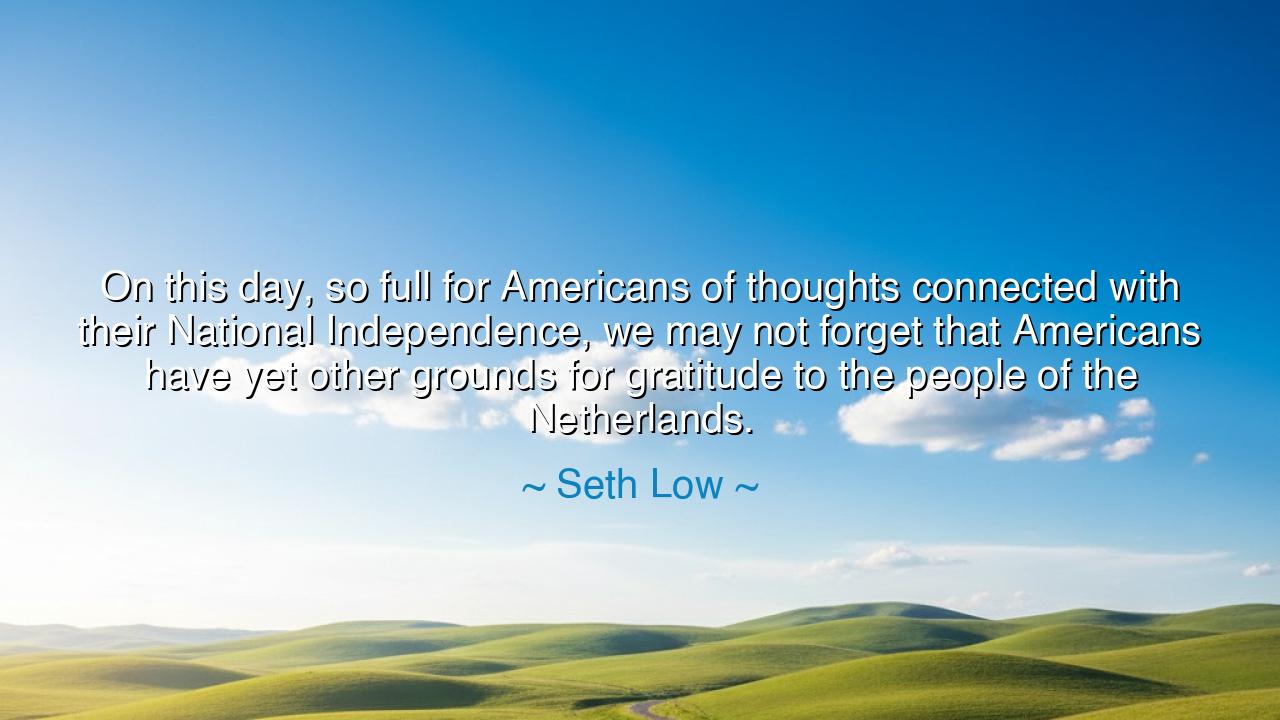
On this day, so full for Americans of thoughts connected with
On this day, so full for Americans of thoughts connected with their National Independence, we may not forget that Americans have yet other grounds for gratitude to the people of the Netherlands.






Hear the thoughtful words of Seth Low, the American scholar and statesman, who once declared: “On this day, so full for Americans of thoughts connected with their National Independence, we may not forget that Americans have yet other grounds for gratitude to the people of the Netherlands.” These words, solemn and gracious, are both a reminder and a tribute — a reminder that the birth of independence is never wrought by one people alone, and a tribute to the unseen hands and kindred spirits who shaped the destiny of a young nation. In this reflection, Low teaches that gratitude is not bound by borders, and that liberty itself is often a child of many fathers.
The origin of these words lies in the years following America’s triumph in the War of Independence. Seth Low, speaking at a time of reflection and renewal, sought to remind his countrymen that their freedom was not achieved in isolation. The Netherlands, that small yet mighty republic of merchants and thinkers, had played a quiet but vital role in the American Revolution. Long before the thunder of Yorktown, the Dutch had shown sympathy for the cause of liberty — providing arms, loans, and diplomatic recognition when few dared to defy the British crown. Their port of St. Eustatius became the lifeline of the American struggle, a place where ships laden with gunpowder, muskets, and hope met the needs of the revolutionaries.
It was in 1776, the very year of America’s Declaration of Independence, that the Dutch on the island of St. Eustatius first saluted the flag of the United States — the first foreign recognition of the new republic. That salute was not a mere gesture; it was a message to the world that the flame of freedom had been seen, and that others stood ready to honor it. To the Americans of that age, the Dutch example of republicanism — their centuries-old fight against Spanish tyranny, their devotion to trade, learning, and tolerance — stood as both inspiration and affirmation. Low, in his wisdom, saw that this connection should never be forgotten.
His words thus ring with a double meaning: one of gratitude and one of humility. For in remembering the Netherlands, Americans are reminded that even the greatest revolutions are built upon shared ideals — upon a brotherhood of nations that cherish freedom and human dignity. To forget this is to fall into the arrogance of isolation; to remember it is to honor the truth that liberty, like light, is not confined to one horizon. The ancients understood this well: they believed that every noble act in one corner of the earth sends ripples across all lands, awakening courage where despair once dwelt.
Consider the story of the Dutch Republic itself — born from its own war of independence against Spain in the sixteenth century. For eighty years, the Dutch fought with courage, forging a state built on self-governance, commerce, and freedom of conscience. Their independence became a beacon that inspired later revolutions — in America, in France, and beyond. Low’s gratitude, therefore, was not only political but spiritual: he recognized that the ideals of the Netherlands had helped to shape the very soul of the American Republic.
In this way, his words carry a timeless wisdom: that nations, like men, are strongest when they remember their debts of honor. Gratitude is the foundation of unity, and remembrance is the guardian of peace. When a people forget those who aided them, they risk forgetting themselves — their humility, their history, their purpose. To be independent does not mean to be alone; it means to stand proudly, yet mindful of the shoulders upon which one stands.
So let this be the lesson for all generations: gratitude sustains liberty. As Low reminds us, the celebration of independence must never become a song of pride only, but also one of remembrance. On days of triumph, look beyond your borders; on days of peace, recall the sacrifices of others. Just as America once found friendship in the courage of the Dutch, so too must every nation honor the bonds that tie the free together. For only through gratitude can the spirit of independence remain pure, and only through remembrance can peace endure.
Thus, my children, take Seth Low’s words to heart: as you rejoice in your own freedom, remember those who helped to make it possible. Let your independence be not a wall, but a bridge — a bridge between peoples, between past and present, between the self and the world. For freedom, when coupled with gratitude, becomes not merely a right, but a sacred trust — a gift to be guarded, and a light to be shared with all mankind.






AAdministratorAdministrator
Welcome, honored guests. Please leave a comment, we will respond soon